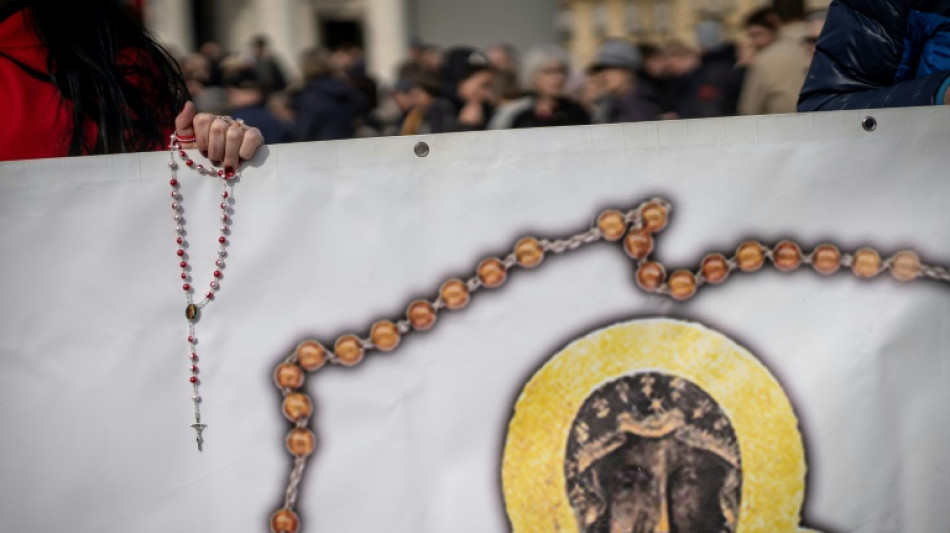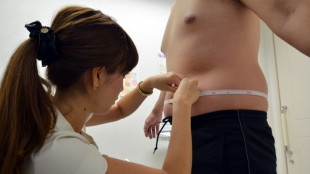
-
 Trump's policies won't push up inflation, economic advisor says
Trump's policies won't push up inflation, economic advisor says
-
German far-right AfD takes aim at Bauhaus movement

-
 Djokovic makes slice of history as Zheng stunned in Melbourne
Djokovic makes slice of history as Zheng stunned in Melbourne
-
The journalists behind Sarkozy's Libya corruption woes

-
 SpaceX set for seventh test of Starship megarocket
SpaceX set for seventh test of Starship megarocket
-
Record-setting Djokovic trumps Federer on way to Melbourne third round

-
 Private US, Japanese lunar landers launch on single rocket
Private US, Japanese lunar landers launch on single rocket
-
Spanish youth ditch dating apps for 'real life' love

-
 Pakistan plot spin blitz as West Indies return after 19 years
Pakistan plot spin blitz as West Indies return after 19 years
-
Alcaraz tips 'incredible' Fonseca to be among world's best 'soon'

-
 Stunned Zheng blames lack of warm-up for early Melbourne exit
Stunned Zheng blames lack of warm-up for early Melbourne exit
-
Ominous Alcaraz 'really, really happy' with Australian Open form

-
 Pakistan's Imran Khan defiant even as longer sentence looms
Pakistan's Imran Khan defiant even as longer sentence looms
-
Bangladesh's Yunus demands return of stolen billions

-
 Relieved Sabalenka defies serve struggles to stay alive in Melbourne
Relieved Sabalenka defies serve struggles to stay alive in Melbourne
-
Zheng out in Melbourne shock as Sabalenka, Osaka battle through

-
 Osaka gets 'revenge' on Muchova in Australian Open fightback
Osaka gets 'revenge' on Muchova in Australian Open fightback
-
Mitchell leads Cavs over Pacers, Thunder beat 76ers

-
 S. Korea's Yoon: from rising star to historic arrest
S. Korea's Yoon: from rising star to historic arrest
-
Ominous Alcaraz sweeps into Australian Open third round

-
 'Queen Wen' deposed in huge shock at Australian Open
'Queen Wen' deposed in huge shock at Australian Open
-
Vigilante fire clean-up launched by local Los Angeles contractor

-
 Zheng dumped out in huge shock as shaky Sabalenka battles through
Zheng dumped out in huge shock as shaky Sabalenka battles through
-
Asian equities mixed as US inflation, China data loom

-
 'Queen Wen' Zheng deposed in huge shock at Australian Open
'Queen Wen' Zheng deposed in huge shock at Australian Open
-
Renewed US trade war threatens China's 'lifeline'

-
 China's economy seen slowing further in 2024: AFP survey
China's economy seen slowing further in 2024: AFP survey
-
Shaky Sabalenka overcomes serve struggles to stay alive in Melbourne

-
 South Korea's six weeks of political chaos
South Korea's six weeks of political chaos
-
Japan's tourism boom prices out business travellers

-
 What is the pink stuff coating fire-ravaged Los Angeles?
What is the pink stuff coating fire-ravaged Los Angeles?
-
Mediators make final push for Gaza truce deal

-
 Musk, Bezos, Zuckerberg to attend Trump inauguration: report
Musk, Bezos, Zuckerberg to attend Trump inauguration: report
-
Federal probe begins into deadly Los Angeles fires

-
 'We may look easy-going, but...' Canadians veto Trump's merger plan
'We may look easy-going, but...' Canadians veto Trump's merger plan
-
Is obesity a disease? Sometimes but not always, experts decide

-
 Biden issues land protections after LA fires delay ceremony
Biden issues land protections after LA fires delay ceremony
-
Cuba to free over 550 prisoners after removal from US terror list

-
 Williams, Vine vie for season-opening Tour Down Under crown
Williams, Vine vie for season-opening Tour Down Under crown
-
Maresca 'concerned' as Chelsea winless run stretches to five games

-
 'Outstanding' Liverpool deserved more than Forest draw: Slot
'Outstanding' Liverpool deserved more than Forest draw: Slot
-
Guardiola laments Man City decision-making in Brentford collapse

-
 Marseille dumped out of French Cup on penalties
Marseille dumped out of French Cup on penalties
-
Liverpool frustrated by Forest, Man City blow late lead at Brentford

-
 Djokovic, Sabalenka chase history as Australian Open hits round two
Djokovic, Sabalenka chase history as Australian Open hits round two
-
Golf star Woods pledges support amid 'unimaginable loss' of LA fires

-
 Liverpool held by Forest, Man City blow late lead at Brentford
Liverpool held by Forest, Man City blow late lead at Brentford
-
Cuba to free 553 prisoners after removal from US terror list

-
 Leverkusen win to go one point behind Bayern, Kiel down Dortmund
Leverkusen win to go one point behind Bayern, Kiel down Dortmund
-
Jota rescues leaders Liverpool in Forest draw


Young Poles abandoning 'frozen' Catholic Church
It is still one of Europe's most Catholic countries but Poland is seeing a rapid secularisation -- particularly among younger generations.
"The children on my courses barely know who Adam and Eve were," said Dawid Gospodarek, a journalist from the Catholic press agency who teaches ethics and religious culture at a school in Warsaw.
According to the latest polls by the CBOS institute, 84 percent of Poles say they are Catholic and 42 percent say they are practising.
Among 18-24-year-olds, only 23 percent say they are practising -- compared to 69 percent in 1992.
Theologian and anthropologist Stanislaw Obirek says the Church has lost relevance for young people because of a refusal to move with the times.
"The Polish Church played a crucial role in the liberation from the Communist regime in the 1980s," said Obirek from the University of Warsaw.
"It retains a superior attitude and a frozen hierarchy that rejects modernisation," he said.
"Poles who have grown up in an open society no longer recognise themselves in it."
- 'Spiritually empty' -
Young people are increasingly turning away from an institution often perceived as being in crisis, damaged by revelations of sexual abuse and accusations of interlinkage with political authorities.
A symptom of this trend is mockery of the late pope John Paul II, an emblematic figure of Polish Catholicism whose statues dot the country.
The number 2137 -- the exact time of his death in 2005 at the age of 84 -- has become an ironic code on social media for making fun of the Polish pontiff.
For young people who do go to church, talking about faith is no longer seen as normal.
"It is impossible for me to talk about religion with my friends because they make fun of me," said Weronika Grabowska, a 25-year-old economy student.
Grabowska remembers "spiritually empty" masses from her childhood with old-fashioned sermons.
"If a priest reproached me for living with my partners without being married, I would be sad. Then I would go look elsewhere," she said.
Sexuality and reproductive rights are one of the points of tension between the Church and society.
"In the 1990s, homosexuality was seen as an invention of the decadent West," said Robert Samborski, a former seminarian who lost his faith.
Like many, Samborski was sent to a seminary "like other young men not interested in women".
"LGBTQ+ people have been more visible in recent years which makes the homophobic discourse of the Church unacceptable" said Samborski.
- Reform or tradition? -
While Samborski and others predict a collapse for the Polish Catholic Church, some believers hope for reform of the institution.
The Catholic organisation Congress advocates a more liberal approach to religion and contests the clerical hegemony in Poland.
Its members align themselves more with the more open approach of Pope Francis and progressive German Catholics, who have for example allowed blessings for homosexual couples in church.
"I would like to be adopted by the German Catholic Church," said Uschi Pawlik, a bisexual Catholic who works in the foundation Faith and Rainbow.
She is "not very optimistic" about the future of Polish Catholicism and its capacity to reform itself.
Other groups of believers hold to more traditional views and see Poland as a last bastion for Catholicism.
Piotr Ulrich, a 22-year-old organist, attends the Latin mass practised in some Warsaw parishes.
In his circles, condemnation of sex before marriage, homosexuality, abortion and in vitro fertilisation are not subject to debate.
Ulrich said Poland has a "messianic role" for Christianity and says the Church's power is "in the propagation of a clear message not the dilution of its identity".
T.Bondarenko--BTB
